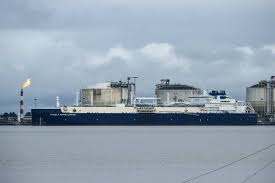
President of Dangote Group, Aliko Dangote, has revealed that the $20 billion Dangote Petroleum Refinery is increasingly depending on crude oil imports from the United States as a result of ongoing supply challenges in Nigeria.
Speaking during a visit by the Technical Committee of the One-Stop Shop (OSS) for the sale of crude and refined products in naira, Dangote confirmed that the refinery Africa’s largest has struggled to secure consistent domestic crude allocations, forcing it to seek reliable feedstock from international markets, particularly the U.S.
Between April and July 2025, the refinery is expected to take delivery of around 17.65 million barrels of crude oil, with over 3.65 million barrels already received in April and May. A significant portion of this volume consists of West Texas Intermediate (WTI) Midland, a high-quality light sweet crude sourced from the U.S., which the facility is optimized to process.
Dangote praised the federal government’s naira-for-crude initiative, championed by President Bola Tinubu, stating that it has contributed to lower fuel prices, eased demand for dollars, and stabilized the naira. However, he stressed that the refinery’s full operational capacity pegged at 650,000 barrels per day (bpd) Is threatened by local crude shortages, despite the swap deal in place with the Nigerian National Petroleum Company Limited (NNPC).
“The naira-for-crude policy has been instrumental in reducing product prices and supporting the local economy,” Dangote noted. “But to keep the refinery running at the desired levels, we’ve had to supplement with imported crude, especially from the United States.”
U.S. Oil Becomes Key Feedstock
Recent data compiled by maritime tracking firm Blue Sea Maritime shows that 21 oil vessels delivered crude oil to the Dangote Refinery via Lagos ports between April 6 and May 28, 2025. Cumulatively, these shipments accounted for over 3.6 million barrels, with additional volumes scheduled through July.
This shift follows a broader trend in the refinery’s procurement strategy. Since December 2024, U.S. crude imports have surged to 27.1 million barrels, accounting for roughly one-third of all supply, compared to 46.2 million barrels allocated by NNPC over the same period.
The reason for this pivot, experts say, lies in both supply reliability and product yield advantages. WTI Midland offers better reformate and gasoline blending capabilities, making it more suitable for large-scale refining operations like Dangote’s. In contrast, Nigerian grades such as Bonny Light and Qua Iboe, while technically similar, face frequent disruptions due to underinvestment, insecurity, and pipeline issues.
“Feedstock predictability is critical. A facility of this scale cannot afford supply disruptions, even if the crude is sourced from next door,” said a senior analyst at Rystad Energy.
A Symbol of Industrial Ambition
During the OSS delegation’s visit, the committee’s coordinator, Maureen Ogbonna, described the refinery as a “breath of fresh air” and a bold symbol of Nigeria’s industrial transformation. She praised Dangote’s vision and commitment to building a self-sufficient energy infrastructure for the country.
“This refinery touches every part of our lives from pharmaceuticals to plastics, food to transportation,” she said. “It’s a national and continental milestone.”
Ogbonna also highlighted the refinery’s world-class laboratory and deep-sea port, calling them unprecedented in scope and sophistication within Africa. She reaffirmed the government’s commitment to eliminating regulatory and logistical obstacles hindering crude supply to local refiners under the renewed naira-for-crude deal.
Crude Supply and Future Outlook
Despite its Nigerian roots, the refinery has broadened its sourcing net, bringing in crude from Brazil, Angola, and Libya but the United States now dominates its imports. Vessel tracking shows deliveries of WTI crude started on April 1 with 130,000 barrels, followed by nearly daily shipments, including a 273,454-barrel cargo on May 24 and another 247,989 barrels on May 27.
Energy experts note that Nigeria’s failure to meet local crude supply expectations, despite its oil wealth, raises serious questions about the efficiency of the current allocation system.
In the face of these challenges, Dangote reaffirmed his commitment to supporting the Nigerian economy, pledging to maintain stable fuel prices and ensure the refinery plays a central role in the country’s economic recovery.
“We are grateful to President Tinubu for enabling this partnership,” said the refinery in a recent statement. “The naira-for-crude initiative has helped us keep product prices affordable, and we remain committed to this national duty.”





